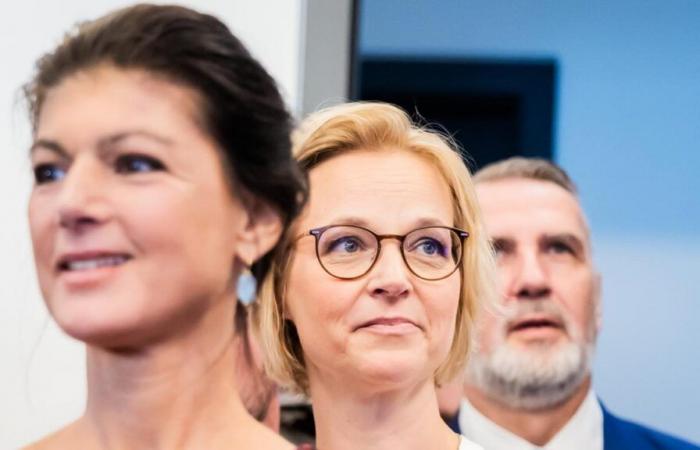As of: October 31, 2024 6:00 p.m
Ten months after its founding, a power struggle is raging at BSW. The federal leadership around Sahra Wagenknecht does not agree with the Thuringian regional association’s agreements for a coalition. Will there be a split?
Sahra Wagenknecht has had a problem since Monday at the latest, and that is the representatives of her party in Thuringia. There is talk of a “palace revolution” behind closed doors. With Katja Wolf spearheading an uprising in the Sahra Wagenknecht alliance against Sahra Wagenknecht.
The BSW in Thuringia presented a paper on Monday that deviates from the BSW course when it comes to foreign policy and is more towards the possible coalition partners CDU and SPD. “Different traditions and perspectives are not obstacles, but rather drivers for new political creativity,” it says.
And specifically regarding the planned stationing of American missiles on German (although not Thuringian) soil it says: “We also recognize that many people in Thuringia are critical of or reject the planned stationing of medium-range and hypersonic missiles. The future government of the Free State Thuringia promotes a broad-based debate and also gives this attitude a public voice in the spirit of a sustainable commitment to peace.”
Wagenknecht’s veto
On Monday there was a board meeting in Erfurt, which – we hear – was also attended by the federal leadership of the BSW. But then there are different versions of the events. It is unclear how Wolf involved Wagenknecht in the negotiations with the CDU and SPD. Apparently Wagenknecht knew the paper with which the three future coalition members went to the press on Monday afternoon, but she was only informed about it at very short notice. One thing is clear: Wagenknecht has vetoed it.
It was clear to Wolf and the new state parliamentary group in Thuringia that they were embarking on a new path when they appeared in front of the press on Monday afternoon and announced a breakthrough and coalition talks with the CDU and SPD. Those in the BSW who do not support this path – and that is the federal leadership, including Sahra Wagenknecht – speak of a “weak coalition that has no intention of changing anything.”
Three days after Wolf announced that the BSW in Thuringia wanted to start coalition talks with the CDU and SPD, we heard from BSW circles that the dispute between Wolf and Wagenknecht had already gotten so far that it was assumed that Wolf would leave the party become. It is questionable how many BSW people in the 15-member faction will follow Wolf.
Heated atmosphere
The mood is heated, Wolf doesn’t go in front of a camera and can only be quoted in a few words: “With our preamble we have shown how fundamental the peace issue is to us. We have negotiated this hard. In the coalition negotiations, we have a clear goal Commitment to peace and diplomacy and stable conditions in Thuringia.”
This does not seem to appease the BSW party executive committee, as it expresses itself unequivocally in a resolution on the coalition negotiations: “We expect our Thuringian negotiators to insist that the foreign policy positioning of the future state government is clarified as part of these negotiations and also in state policy The issues in the coalition agreement are far more prominent than the BSW’s handwriting can be seen in the current exploratory paper.”
“This is unacceptable for us”
And what the BSW leadership believes should happen if it is no longer possible to negotiate with the CDU and SPD is clearly described: (Then) “we should refrain from entering a joint government and advance our election promises from the opposition.” .
The co-chair of the BSW, Amira Mohamed Ali, says about the events in Thuringia: “This question about war and peace is elementary for us. That was also the case in the election campaign and Katja Wolf was always involved and there. After “It is not clear to me how a coalition of CDU, SPD and BSW would vote if there was a vote to station missiles on German soil in the Thuringian state parliament. And that is unacceptable for us.”
Is the split coming?
On Saturday there will be a meeting of all 81 BSW party members in Thuringia. They probably want to approve the decision according to which the BSW enters into coalition talks. Many BSW people are worried that the BSW will split, barely ten months after it was founded.
The current survey shows that internal party disputes are not good for electoral success ARD Germany trend. After that, Germany-wide approval of the BSW drops by two percentage points to just six percent.






